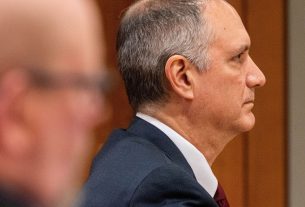Following that sobering assessment, António Guterres also told the World Economic Forum meeting in Davos, Switzerland, that he remained committed to alleviating the suffering of Ukrainians and vulnerable people in the wider world, still reeling from the conflict’s “dramatic, devastating impacts” on the global economy.
“There will be an end…there is an end of everything, but I do not see an end of the war in the immediate future,” Mr. Guterres said. “I do not see a chance at the present moment to have a serious peace negotiation between the two parties.”
Tragic chopper crash reaction
In a related development, the UN’s top humanitarian official in Ukraine expressed her deep sadness at the helicopter crash close to a kindergarten, in a Kyiv suburb on Wednesday morning, which claimed the lives of at least 18 victims, including the country’s Interior Affairs Minister.
“I am deeply saddened by the tragic deaths of the Ukrainian Minister of Internal Affairs Denys Monastyrskyi, First Deputy Minister Yevhen Yenin and State Secretary Yurii Lubkovych,” said Denise Brown. The UN Resident Coordinator for Ukraine confirmed that other unnamed Government officials and residents, including children, had been killed and injured in the incident at Brovary.
A man mourns his deceased best friend at a cemetery in Bucha, Ukraine.
Worlds apart
Reiterating that the February 24 Russian invasion violated international law and the UN Charter, the Secretary-General underscored the difficulty of ending the violence, when the two sides continued to have “two different ideas about what the Russian empire was, what the nationalities were”.
He added: “This makes it more difficult to find a solution, but that solution needs to be based on international law and needs to respect territorial integrity…I don’t see conditions for that to happen in the immediate future.”
With Ukrainian and Russian fighters entrenched in a war of attrition, Mr. Guterres insisted that the UN had nonetheless helped to secure the support of Kyiv and Moscow to ship desperately-needed grain and fertilizer to countries either facing or trying to ward off spiralling food insecurity.
To date, 17.8 million tonnes of commodities have been shipped under the Black Sea Grain Initiative, to countries including Afghanistan, China, Israel, Kenya and Tunisia, with corn, wheat and sunflower meal or oil delivered in the greatest quantities.
UN committed to peace
The UN has also remained engaged with Ukrainian and Russian representatives on several other flashpoint areas in the interests of peace, the Secretary-General insisted.
These included discussing prisoners of war exchanges with both sides, to supporting the work of the UN International Atomic Energy Agency, IAEA, in its efforts to secure the stricken Zaporizhzhia nuclear power station and all other plants in the country. “We are doing everything we can…to limit the damage, to reduce the suffering”, guided by the twin tenets of international law and territorial integrity, Mr. Guterres maintained.
Mr. Guterres said that with the world facing the gravest levels of geopolitical division and mistrust “in generations”, leaders at Davos and elsewhere needed to bridge divides and restore cooperation to advance peace, sustainable development and human rights.

Mountain communities in the Hindu Kush Himalaya region, including the municipality of Mustang in Nepal above, are already feeling the effects of biodiversity loss, increased glacial melting, to less predictable water availability, as climate change hits..
Climate crisis reminder
In a wide-ranging speech to global leaders at Davos covering everything from a looming US-China clash to the growing disconnect between the Global South and the Global North, the UN Secretary-General issued a fresh call for the world’s leaders not to ignore the climate crisis.
“Every week brings a new climate horror story,” he said, in a call to industrialised nations to “finally deliver” on their $100 billion climate finance commitment to support developing countries. “Greenhouse gas emissions are at record levels and growing. The commitment to limit global temperature rise to 1.5 degrees is nearly going up in smoke. Without further action, we are headed to a 2.8-degree increase.”
Unless tough political decisions are made to tackle the climate crisis, Mr. Guterres warned that “for many, it would mean a death sentence”.
Private industry needed to do more to help the climate too, he insisted, before calling on corporate leaders attending Davos to abide by UN-backed net-zero guidelines, and not “dubious or murky” benchmarks.
“Without creating the conditions for the massive engagement of the private sector, it will be impossible to move from the billions to trillions that are needed to achieve the Sustainable Development Goals (SDGs),” the Secretary-General maintained.

On Civil Society and Energy Day at COP27, activists protest against oil and gas exploration in Africa.
‘Big Oil’ challenge
The UN chief also tackled major fossil fuel producers, highlighting recent reported revelations that some “were fully aware in the 1970s that their core product was baking” the planet.
“Some in Big Oil peddled the big lie,” the UN chief continued, “yet we know the ecosystem meltdown is cold, hard, scientific fact”.
In an appeal for greater international cooperation and trust-building to solve so many interlinked problems, Mr. Guterres warned that divisions between the United States and China risked decoupling the world’s two largest economies.
Such a split – costed at $1.4 trillion to the global economy by the International Monetary Fund – would lead to “two different sets of trade rules, two dominant currencies, two internets and two conflicting strategies on artificial intelligence. This is the last thing we need,” the Secretary-General said.
And although it was to be expected that US-China relations differ on human rights and security issues, it is essential that both continue to engage meaningfully on climate, trade and technology, “to avoid the decoupling of economies or even the possibility of future confrontation”.
North-South divide
The UN chief also warned that the North-South divide “is deepening”, because of “frustration and anger about the gross inequity of vaccine distribution in the recent past (and) about pandemic recovery”, which had seen support “overwhelmingly concentrated in wealthier countries that could print money”.
Trillions of dollars had been printed in the global North, Mr. Guterres explained, while developing countries “could not print money because their currencies would go down the drain”.
The Global South was also being crippled by the climate crisis – despite contributing least to global heating – and the lack of the financial resources to respond to the challenge, the UN chief continued.
Repeating his call for multilateral development banks to “change their business model”, the Secretary-General explained that emerging countries really needed is access to a “massive inflow of private finance at reasonable rates of interest.
“International financial institutions are too small and the capacity to increase Overseas Development Assistance is not to be seen in the short term,” he said.



